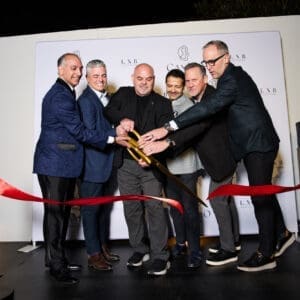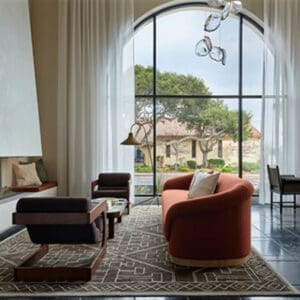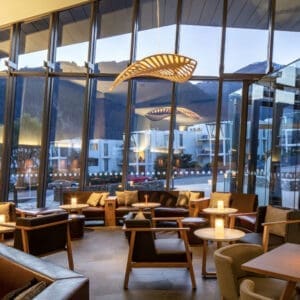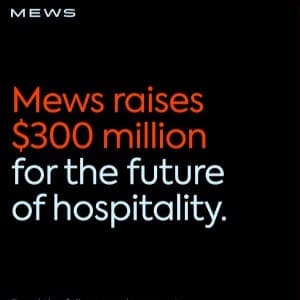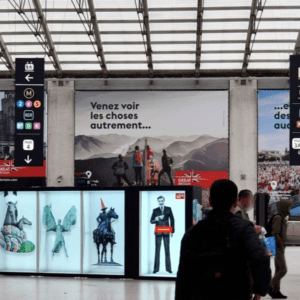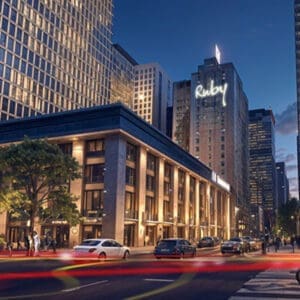 As performance metric growth slows and supply grows, hotel projects find themselves under greater scrutiny. This is especially true for more high-profile, high cost luxury and upper-upscale developments. Speakers on the ‘Strategies for successful development of upscale and luxury hotels’ panel shared some of the biggest issues facing high-end development projects today.
As performance metric growth slows and supply grows, hotel projects find themselves under greater scrutiny. This is especially true for more high-profile, high cost luxury and upper-upscale developments. Speakers on the ‘Strategies for successful development of upscale and luxury hotels’ panel shared some of the biggest issues facing high-end development projects today.
1. Financing
Marty Collins, CEO of Gatehouse Capital, said he’s definitely noticed increased difficulty in getting funding for luxury development.
ÒUnquestionably, it’s getting tougher to finance,Ó he said. ÒAs [revenue per available room] flattens, and with the proliferation of soft brands and select-service brands, it’s getting harder to do full-service hotels. They’re the toughest thing to do.Ó
He noted that even though it’s more difficult, that doesn’t make it impossible, and Gatehouse has roughly 20 projects in the pipeline. But he doesn’t see the increased difficulty of development as necessarily a bad thing because of the natural dampening effect it puts on supply growth.
Taking a long-term view, Mr Collins said unique, high-end hotels in key markets could be better poised for success even if the industry faces a recession in the near future.
ÒAt least in the lifestyle segment, we’ll be in places people want to live and work,Ó said Mr Collins. ÒAt the end of the day, if you make a misstep in Oklahoma City, you’re going to be living with that a long time as opposed to these growth markets.Ó
2. Brands
Panelists agreed the hotel industry has a cacophony of brands that could be working to its detriment.
Hal Thannisch, President at Thannisch Development Services, said the reasons for brands’ existence laid out by industry insiders don’t always resonate with consumers.
ÒI wonder how confusing [brand proliferation] is to the consumer,Ó he said.
On top of that, Ali Kasikci, President and CEO of Bentley Management, said brands often are kept on life support for reasons other than their viability in the marketplace.
ÒSometimes people try to keep things alive for emotional or nostalgic reasons,Ó he said. ÒThere’s nothing worse than that. It’s arrogance, denial and nostalgia. A lot of the time we think brands have lasting value that lasts forever. That’s not what the consumer thinks.Ó
3. Impact of consolidation
The universe of brands only got more confusing for some with the merger of Marriott International and Starwood Hotels & Resorts Worldwide, panelists said. Many were left wondering just how long it’d take for the latter company to fully ÒdigestÓ the former and just how Marriott plans to draw clear lines between its many overlapping brands.
With all that said, Richard Kessler, President, CEO and COO of the Kessler Enterprise, still believes the merger will be a long-term benefit for his company and the industry.
ÒThe one thing I look at is the leadership of the company,Ó he said. Ò[Marriott President and CEO] Arne [Sorenson] is an extremely bright hotelier. I have no doubt he will be able to morph these into a form that makes sense. Right now, they have 27 brands, and they’re stretching to hit on some of them. In terms of digesting, I think over two or three years it will be 80 per centÊdigested then the next two to three will be spent sorting these brands out and melding some together.Ó
Mr Collins expressed skepticism over the current makeup of Marriott’s stable of brands, but said ultimately he thinks the issues will be taken care of.
ÒThis is the biggest brand in the world, and at the end of this (Marriott) will still rule it,Ó he said. ÒThere will be a lot of twists and turns, but I’m sure they’ll get through it.Ó
4. Importance of controlling construction costs
Panelists noted that luxury developments will always be pricier prospects than their more streamlined select-service counterparts, but that doesn’t mean keeping the cost of building down as low as possible isn’t important for the success of a new hotel.
Mr Collins recalled his experience as one of the early developers of the W brand, and how controlling costs helped those properties, and ultimately the brand itself, succeed.
ÒThey were never cheap, but they were never ridiculously expensive,Ó he said. ÒAn awful lot were new builds. Linking in residential helped, and linking in billboards helped. We just executed sales on the W Hollywood and the W San Diego, and I think that’s kind of vindicated the investment thesis.Ó
Mr Thannisch said it’s important to think about the cost in context of the value you’ll ultimately derive from the property. That sometimes means investing to make a property unique and desirable.
ÒThat’s been the lesson for us,Ó he said. ÒIt’s all dramatically changing today. Back then, it was all about the box. Today it’s less about the box and more about the ethereal things around the box. That guest curriculum is not contained on property anymore. It’s an extension of the property into the culture it happens to sit in.Ó
5. Generational impact
Guests’ desires are evolving as the generational profile of travelers changes over time, panelists said.
Mr Thannisch said millennials are more of a moving target than Gen Xers or Baby Boomers.
ÒThey’re more fluid than previous generations,Ó he said. ÒThey have tastes and desires for what is a vacation and what’s the luxury business environment they want to be in. It’s all being refined, and if you don’t pay attention, then you’re making a big mistake as a developer.Ó
He said this generational shift is something that’s pushing more programming off property.
ÒThe entertainment value of what’s around you is key to the guest experience,Ó said Mr Thannisch. ÒYou don’t keep them inside the hotel anymore. They need access to activity and entertainment. They need variety and shopping. It’s much more of a community-type environment. The hotel is spare bedrooms for guests in a much bigger community.Ó
Mr Collins said it’s hard to put quick descriptors on any generation, but if pressed he would say millennials are looking for hotels that are Òless gold-plated and more experiential.Ó
ÒIf there’s a white tablecloth, it’s likely in the middle of a jungle,Ó he said. ÒPeople are as comfortable with African glamping as they are with traditional penthouses.Ó




